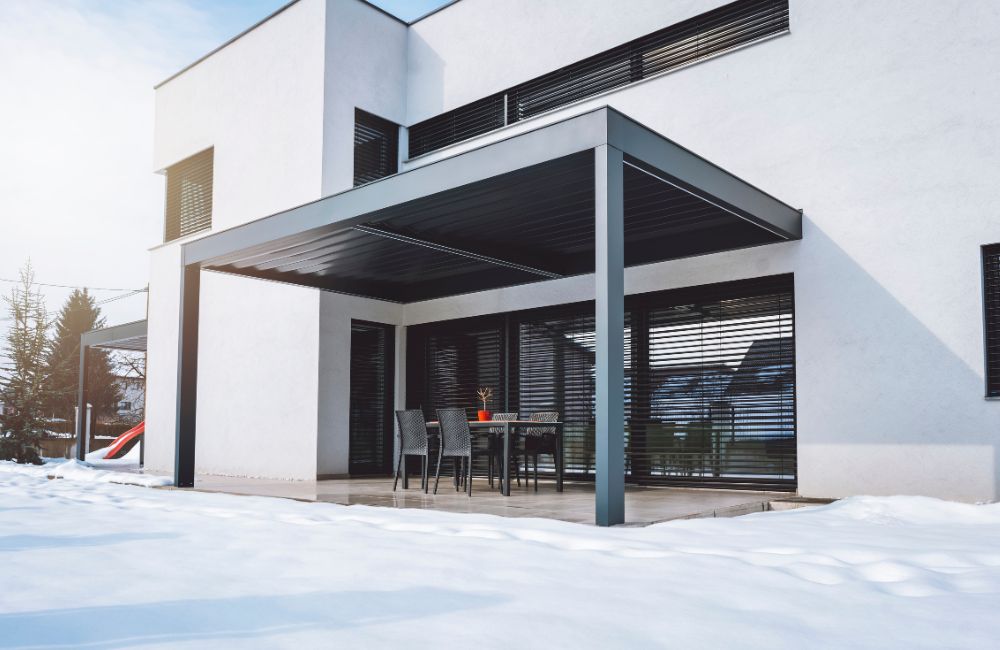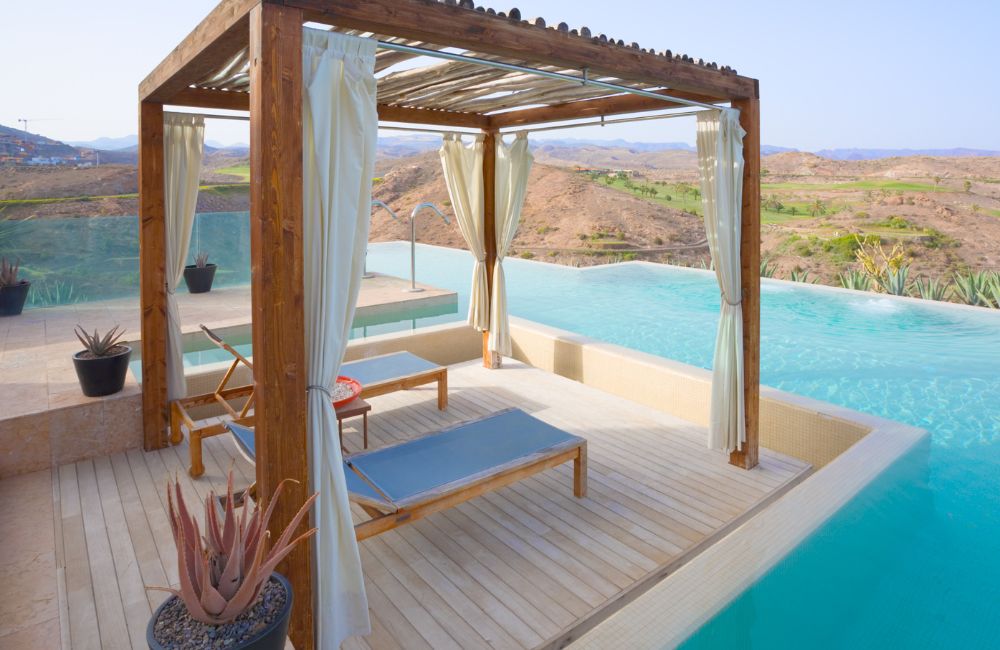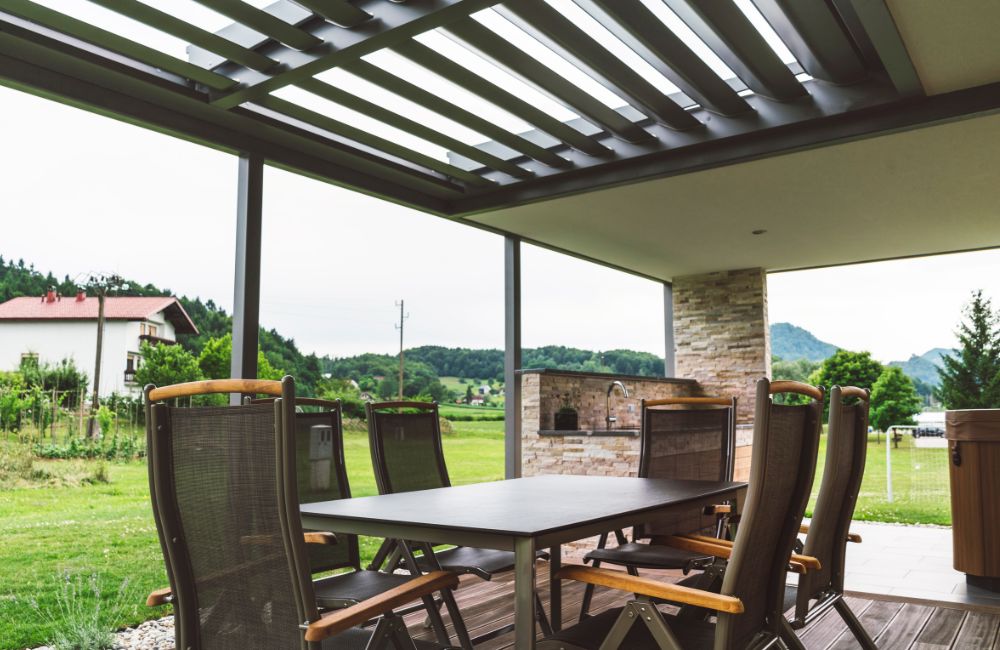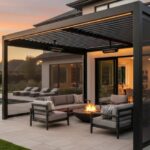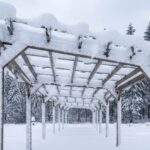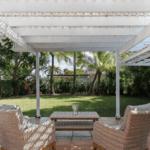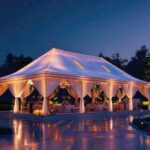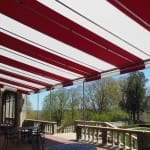Table of Contents
Key Takeaways
What Are Louvered Pergolas?
How to Choose the Perfect Louvered Pergola for Your Backyard
- Assess Your Space
- Choose the Materials You Want
- Take Note of Your Design and Style Options
- Consider Functional Features
- Check Your Budget
- Choose Between DIY and Professional Installation
- Check Permits and Regulations
- Enhance Your Pergola with Accessories
- Follow Maintenance Tips
Important Considerations Before You Buy
Frequently Asked Questions
Ready to Transform Your Backyard with a Louvered Pergola?
Key Takeaways
|
What Are Louvered Pergolas?
A louvered pergola is a type of outdoor structure featuring adjustable louvers. These louvers can be tilted to control the amount of sunlight and airflow entering the space. Unlike traditional pergolas with fixed slats, the louvers in a louvered pergola can be adjusted to provide shade, ventilation, or full sunlight as needed. This flexibility makes louvered pergolas an excellent choice for those who want a customizable outdoor living area.
4 Benefits of Louvered Pergolas
- Versatility: Adjust the louvers to create the perfect environment, whether you need shade on a hot day or want to let in more light.
- Aesthetics: Enhance the visual appeal of your backyard with sleek and modern designs.
- Functionality: Use the space for various activities, from dining to relaxation.
- Durability: Often made from robust materials that withstand the elements, ensuring long-term use.
How to Choose the Perfect Louvered Pergola for Your Backyard
Selecting the ideal louvered pergola for your backyard involves careful consideration of various factors to ensure it perfectly complements your outdoor space while meeting your functional and aesthetic needs.
1. Assess Your Space
Measure Your Backyard
Before you invest in a louvered pergola, it’s crucial to assess your backyard space. Start by measuring the area where you plan to install the pergola. Ensure it fits well within the designated space without overwhelming other elements of your backyard. Accurate measurements will help you avoid the hassle of buying a pergola that doesn’t fit properly.
Consider Existing Structures and Landscape Elements
Take into account any existing structures, landscaping features, and the overall layout of your outdoor area. A well-placed louvered pergola should complement your backyard’s design rather than clash with it.
Check Sunlight Patterns and Shade Requirements
Pay attention to the patterns of sunlight and shade throughout the day. Knowing how the sun moves across your backyard will help you determine the best location for your louvered pergola, ensuring optimal use of shade and light.
2. Choose the Materials You Want
Louvered pergolas come in various materials, each with its own set of advantages and disadvantages. The most common materials are wood, aluminum, vinyl, and steel.
| Material | Description | Pros | Cons | Best For |
| Wood | Wood louvered pergolas offer a timeless appeal and can be stained or painted to match your existing outdoor decor. If you live in a humid or rainy climate, consider a more durable wood species like cedar or redwood. |
|
|
Traditional or rustic backyard designs |
| Aluminum | Aluminum louvered pergolas are ideal for those looking for a sleek, modern look. |
|
|
Modern and contemporary designs |
| Vinyl | Vinyl louvered pergolas are an excellent choice for those who want a low-maintenance option. They don’t need to be painted or stained. |
|
|
Cost-effective and easy-care solutions |
| Steel | Steel louvered pergolas are the most durable. However, they require a protective coating to prevent rust. |
|
|
Industrial or robust designs needing extra support |
3. Take Note of Your Design and Style Options
Louvered pergolas come in various designs and styles, making it easy to find one that complements your backyard. Here are some popular styles:
| Style | Characteristics | Best For |
| Modern | Clean lines, minimalist design, often made of aluminum or steel | Contemporary homes and gardens, offering a sophisticated look that complements modern landscaping and outdoor furniture |
| Traditional | Ornate details, wood construction, classic look. These pergolas often have decorative elements like latticework or scrollwork | Older homes and classic garden settings |
| Rustic | Natural materials, rough finishes, earthy tones | Country homes and natural landscapes |
Customization Options
Consider customizing your louvered pergola with different colors, finishes, and decorative elements such as built-in planters or lighting. This allows you to create a unique outdoor space that reflects your personal style. You can add features like built-in seating, integrated lighting, or even a sound system to enhance the functionality and enjoyment of your pergola.
4. Consider Functional Features
Manual vs. Motorized Louvers
When selecting a louvered pergola, think about the functional features that will enhance your outdoor experience. One of the key considerations is whether to opt for manual or motorized louvers. The motorized louvered pergolas sales market size was valued at USD 50 million in 2023 and is projected to reach USD 89.16 million by 2031, growing at a CAGR of 7% from 2024 to 2031.
Manual Louvers
- Pros: Less expensive, no need for electrical work.
- Cons: Requires physical effort each time you want to change the position of the louvers.
Motorized Louvers
- Pros: Convenient, can be automated, often includes remote control.
- Cons: Higher initial cost, requires electrical installation.
Weather Sensors and Automation
Consider adding weather sensors and automation features to your louvered pergola. These systems can automatically adjust the louvers based on weather conditions, enhancing convenience and comfort. For example, rain sensors can close the louvers during a downpour to keep the space underneath dry, while wind sensors can adjust the louvers to prevent damage during strong gusts.
Integrated Lighting and Heating
Adding integrated lighting and heating options can significantly enhance the functionality of your louvered pergola. Lighting extends usability into the evening, while heating allows for year-round use, especially in colder climates. You can choose from various lighting options such as string lights, built-in LED strips, or pendant lights to create the perfect ambiance. For heating, consider options like infrared heaters or gas-powered heaters to keep your outdoor space warm during chilly nights.
Retractable Screens or Curtains
Retractable screens or curtains provide additional shade and privacy, and they can protect against insects. This feature adds to the comfort and usability of your louvered pergola. Screens can be retracted when not needed, allowing you to enjoy an open-air feel, or closed to create a more enclosed and private space.
5. Check Your Budget
Price Range
The cost of a louvered pergola can vary widely based on the material, size, and features you choose. Installing a louvered pergola typically costs between $6,500 and $18,000, or $45 to $125 per square foot on average.
Long-Term Costs
Consider the long-term costs of maintenance and durability when choosing your louvered pergola. Wood requires more upkeep, while aluminum and vinyl are low-maintenance options. Investing in a more durable material upfront can save you money on repairs and replacements over time.
Balancing Budget and Features
Prioritize the features that matter most to you and allocate your budget accordingly. Investing a bit more upfront in higher-quality materials and features can save money in the long run. Consider whether you need all the bells and whistles or if a simpler model will meet your needs. For instance, while motorized louvers and integrated lighting are great features, they may not be necessary for everyone.
6. Choose Between DIY and Professional Installation
Deciding whether to install your louvered pergola yourself or hire a professional is an important step. Here’s what to consider:
| Installation Type | Pros | Cons | Best For |
| DIY Installation |
|
|
Experienced DIYers with the necessary tools and knowledge |
| Professional Installation |
|
– Higher upfront cost | Complex installations or those who lack DIY skills |
Tips for Finding a Reputable Installer
- Research: Look for reviews and ratings online.
- Quotes: Get multiple quotes to compare prices and services.
- References: Ask for references and check past work.
7. Check Permits and Regulations
Before installing your louvered pergola, check local building codes and regulations. Here are some steps to follow:
Check Local Codes
Local building codes and zoning laws vary, so it’s essential to check with your local authorities before starting your project. This will help you avoid fines and ensure your pergola is built to code.
- Contact Local Authorities: Ensure your project complies with zoning laws.
- Permits: Determine if you need a building permit.
Homeowners’ Association Rules
If you live in a community with a homeowners’ association (HOA), you’ll need to get approval for your louvered pergola. HOAs often have specific rules and guidelines for outdoor structures, so make sure your project complies with these regulations.
- HOA Approval: Some neighborhoods have specific guidelines for outdoor structures.
- Compliance: Ensure your louvered pergola meets all requirements.
Tips for a Smooth Approval Process
- Documentation: Have detailed plans and specifications ready.
- Communication: Keep open lines of communication with local authorities and your HOA.
8. Enhance Your Pergola with Accessories
Once your louvered pergola is installed, enhance it with accessories to create a comfortable and stylish outdoor space. Here are some ideas:
Recommended Furniture and Decor
The right furniture and decor can transform your louvered pergola into a cozy and inviting outdoor living area. Consider comfortable seating options and add tables. Decor items can add color and personality to your space.
- Seating: Comfortable chairs, benches, or outdoor sofas.
- Tables: Dining tables, coffee tables, or side tables.
- Decor: Outdoor rugs, cushions, and throws.
Incorporate Plants and Greenery
Plants can add beauty and a sense of tranquility to your louvered pergola.
- Climbing Plants: Wisteria, jasmine, or clematis for a natural canopy.
- Potted Plants: Add greenery and color with potted flowers and shrubs.
- Vertical Gardens: Utilize the structure for vertical planting.
Seasonal Decoration Ideas
Decorating your louvered pergola for different seasons can keep the space fresh and inviting year-round.
- Spring: Fresh flowers and pastel colors.
- Summer: Bright colors and beach-inspired decor.
- Fall: Pumpkins, lanterns, and warm tones.
- Winter: Fairy lights, evergreens, and cozy blankets.
9. Follow Maintenance Tips
To keep your louvered pergola looking its best, follow these maintenance tips:
Routine Cleaning and Care
- Cleaning: Regularly clean the louvers and frame with mild soap and water. Avoid harsh chemicals that could damage the material.
- Lubrication: Lubricate moving parts to ensure smooth operation.
Seasonal Maintenance Checklist
- Spring: Inspect for any damage, clean thoroughly, check for pests.
- Summer: Regularly wipe down to remove dust and pollen.
- Fall: Clean off leaves and debris, prepare for winter.
- Winter: Check for snow buildup and clean promptly to avoid damage.
Tips for Prolonging the Life of Your Pergola
- Cover: Use a protective cover during harsh weather conditions.
- Inspection: Regularly inspect for wear and tear and address issues promptly.
- Professional Maintenance: Consider professional maintenance services for thorough care.
Important Considerations Before You Buy
Before purchasing a louvered pergola, take these important considerations into account:
Key Questions to Ask Yourself
- What do you primarily want to use the pergola for?
- How does your local climate affect your choice?
- What is your budget, including installation and maintenance?
- What design style do you prefer? Modern, traditional, rustic, or a custom design?
- What size and dimensions will fit best in your available outdoor space?
- Are you willing to commit to the maintenance required for certain materials, such as wood?
- Do you want the option to customize your pergola with features like motorized louvers, integrated lighting, or heating?
Consulting with Family or Cohabitants
If you share your outdoor space with family or cohabitants, involve them in the decision-making process.
- Preferences: Discuss design and functionality preferences with others who will use the space.
- Consensus: Ensure everyone is on board with the final decision.
Researching and Reading Reviews
Research is crucial before making a significant investment like a louvered pergola.
- Product Reviews: Look for reviews of specific louvered pergola models.
- Company Reputation: Research the reputation of the manufacturer or installer.
Frequently Asked Questions
How long do louvered pergolas last?
Louvered pergolas typically last 15-25 years, depending on the materials used and maintenance practices. Durable materials like aluminum and steel can extend their lifespan, ensuring long-term enjoyment.
Are louvered pergolas waterproof?
While louvered pergolas are not fully waterproof, they provide good rain protection when the louvers are closed. For added convenience, consider installing weather sensors to automatically adjust the louvers during rain.
Where is the best place to put a pergola in your backyard?
The best place for a pergola is where it provides optimal shade and complements your outdoor layout. Consider proximity to the house, sunlight patterns, and existing structures to maximize functionality.
Should a pergola be the same size as the patio?
A pergola does not have to be the same size as the patio. It can be larger or smaller, depending on your design preferences and functional needs, creating a balanced and appealing outdoor space.
Can a pergola be too big?
Yes, a pergola can be too big if it overwhelms your backyard space or clashes with existing elements. Ensure it fits well within your outdoor area and complements your landscape to maintain harmony and aesthetics.
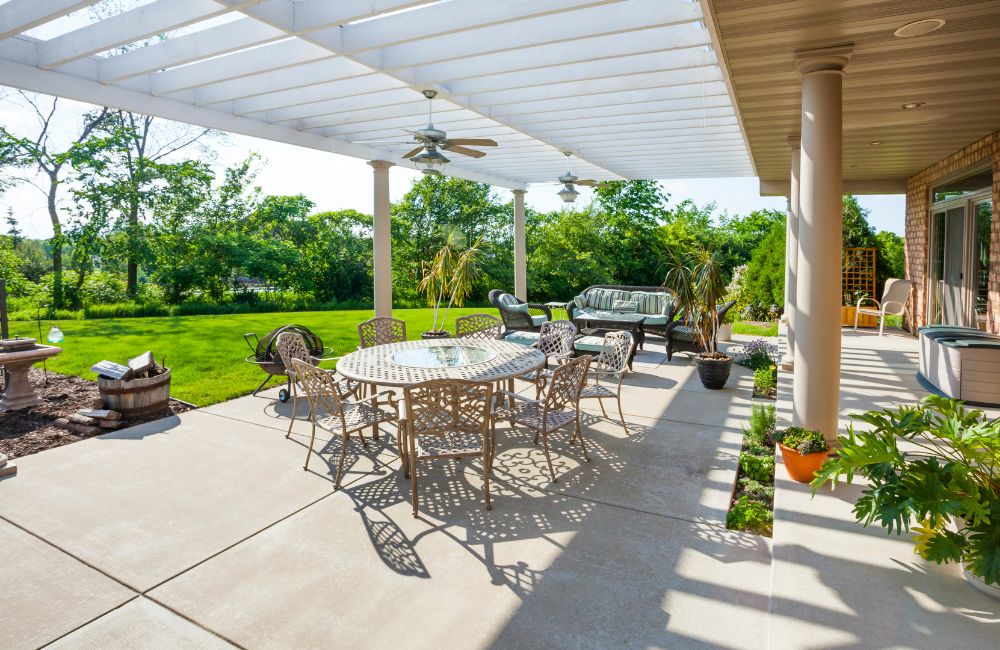
Ready to Transform Your Backyard with a Louvered Pergola?
Upgrade your outdoor living space with a beautiful and functional louvered pergola from Durkin’s in Connecticut. Whether you need shade, style, or a versatile space for entertaining, Durkin’s offers top-quality louvered pergolas tailored to your needs. Visit Durkin’s in Connecticut to explore our extensive range of pergola options and find the perfect fit for your backyard.
Contact Durkin’s today to start your transformation and enjoy your outdoor space in Connecticut like never before!

